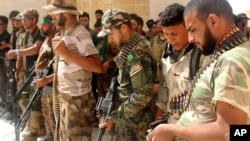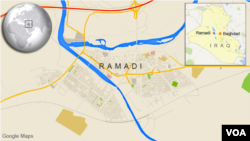With the fall of Ramadi to the Sunni-led Islamic State extremists and Iraqi Shi'ite militias gearing up to fight them, the fear in Washington, and in the region, is that Iraq once again will sink into all-out sectarian war.
Bill Roggio of The Long War Journal said the militias are now eclipsing Iraq’s security forces in the fight against Islamic State, also known as ISIL or ISIS.
"The Iraq government’s reliance on the militias to lead the offensive in Ramadi highlights the deteriorating state of Iraq’s security forces, as well as Iran’s growing influence in the country," Roggio wrote in the Journal, which focuses on the global war on terrorism.
The result could be a bloodbath, some experts warn.
According to the advocacy group Human Rights Watch, in the past militias allied with government forces have forced those they consider terrorists out of their homes, kidnapped them, and in some cases summarily executed them.
"The Shi’ite militias see no difference between IS and other Sunni males, and the Sunnis know that," said Michael Pregent, a former U.S. intelligence officer and military adviser in Iraq.
Shi'ite versus Sunni
The Islamic State likely will use that fear to its advantage, using it as a call to win over more Sunnis.
"It would not be surprising if ISIL sought to spotlight Shia forces fighting in the Ramadi area in an effort to inflame sectarian tensions, or question Baghdad’s intentions," a U.S. intelligence official told VOA on condition of anonymity.
Pregent said Shi’ite militias already are preventing Sunni refugees from leaving Ramadi.
"We are seeing the warnings and indicators of a sectarian conflict on the scale of 2005-2006," Pregent told VOA. But at that time there were 120,000 U.S. soldiers in Iraq. "Today, there is no moderating force."
For Noussaibah Yunis, senior research associate at the Washington-based Project on Middle East Democracy, much depends on how the Shi'ite forces deal with the aftermath in Ramadi. "Can they be self-contained? Can they behave professionally?" she asked.
What comes next?
Pentagon spokesman Colonel Steve Warren said Tuesday it was "unhelpful" that Iraq had used the openly sectarian phrase "Labaik ya Hussein" ("I am here for you, Hussein") as the code name for its operations to retake the city of Ramadi.
"What we didn’t anticipate was that the Iraqi security forces would cease to have primary control over the security situation. The militias backed by Iran now have primary control," Pregent said.
Iraq’s anti-IS operations began Tuesday with efforts to secure lines of communication, key road junctures, intersections and terrain around Ramadi as a prelude to a full-on offensive.
Michael Rubin, a former Pentagon official now with the conservative American Enterprise Institute in Washington, told VOA that the "counteroffensive might be sectarian in a number of dimensions," but that he would not overemphasize the sectarian angle. Sunnis have been the chief victims of the IS brutality, he noted, and most of the refugees fleeing the violence also are Sunnis.
Ramadi is just 120 kilometers from Baghdad. Many analysts doubt that the Sunni extremists would try to seize the capital next, although they could destabilize it.
But there are other options, Pregent said. For example, the Islamic State group could veer off and decide to attack Shi’ite religious cities such as Karbala in an attempt to start a full-on sectarian war.
What will it take to stop ISIL?
Iran would be pushed to protect those holy sites, particularly in the coming months when thousands of Shi’ite Iranian pilgrims will be traveling there during Ramadan, which stretches from June 18 to July 17.
"There is definitely fear that there could be some sort of, not a full-scale attack on Karbala, but a terrorist incident in order to ignite a sectarian war," said Rubin.
Such a high-profile move would be in line with the group’s tactics.
"Given ISIL’s self-declaration of a caliphate last June, it would not be surprising if the group sought to mount a major attack or propaganda blitz to demonstrate its capabilities and attract additional recruits," said the intelligence official.
Foreign policy expert Farhana Qazi said the only way to stop Islamic State extremists is to create a broad Sunni-Shi’ite front against them.
"It’s important to turn the tide and involve the great Sunni coalition," she said. "A regional counterterrorism approach, which includes Iran, is the only way forward."
Since last August, a U.S.-led coalition involving the largely Sunni Gulf states has focused on airstrikes against the extremist fighters, with mixed results.
According to a statement by the U.S. Combined Joint Task Force, military leaders from 21 countries met May 19 and 20 to discuss a way forward in Iraq.
VOA’s Jeff Seldin and Carol Castiel contributed to this report.






